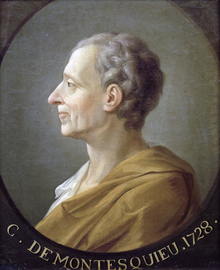Baron Montesquieu
| Montesquieu | |
|---|---|

Anonymous portrait (1728)
|
|
| Born | 18 January 1689 Château de la Brède, La Brède, Aquitaine, France |
| Died | 10 February 1755 (aged 66) Paris, France |
| Era | 18th-century philosophy |
| Region | Western Philosophy |
| School | Enlightenment |
|
Main interests
|
Political Philosophy |
|
Notable ideas
|
Separation of state powers: executive, legislative, judicial; classification of systems of government based on their principles |
|
Influenced
|
|
Charles-Louis de Secondat, Baron de La Brède et de Montesquieu (/ˈmɒntəskjuː/;French: [mɔ̃tɛskjø]; 18 January 1689 – 10 February 1755), generally referred to as simply Montesquieu, was a French lawyer, man of letters, and political philosopher who lived during the Age of Enlightenment.
He is famous for his articulation of the theory of separation of powers, which is implemented in many constitutions throughout the world. He is also known for doing more than any other author to secure the place of the word "despotism" in the political lexicon.
Montesquieu was born at the Château de la Brède in southwest France, 25 kilometres (16 mi) south of Bordeaux. His father, Jacques de Secondat, was a soldier with a long noble ancestry. His mother, Marie Françoise de Pesnel, who died when Charles was seven, was an heiress who brought the title of Barony of La Brède to the Secondat family. After the death of his mother he was sent to the Catholic College of Juilly, a prominent school for the children of French nobility, where he remained from 1700 to 1711. His father died in 1713 and he became a ward of his uncle, the Baron de Montesquieu. He became a counselor of the Bordeaux Parliament in 1714. In 1715 he married Jeanne de Lartigue, a Protestant, who eventually bore him three children. The Baron died in 1716, leaving him his fortune as well as his title, and the office of Président à Mortier in the Bordeaux Parliament.
...
Wikipedia
